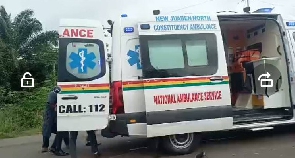 National Ambulance Service (NAS).
National Ambulance Service (NAS).
An initiative to drive public awareness and education on pre-hospital emergency care has been launched in Kumasi.
The initiative is to encourage timely pre-hospital interventions for individuals who experience cardiac arrests.
The initiative, which is under a project dubbed: “The Basic Life Support” was mooted by a non-profit organisation, Elijeko Foundation in collaboration with its partner the National Ambulance Service (NAS).
The launching took place on the sidelines of a day’s workshop on cardiovascular diseases, held in Kumasi.
Mr Andrews Kwabena Nyantakyi, the Founder of the Elijeko Foundation and a U.S. Navy Veteran, disclosed this to the Ghana News Agency in Accra, revealing that cardiac arrest and heart attacks have claimed many lives.
“This is because of the lack of bystanders’ skills to provide timely life-saving resuscitation for victims,” he stated.
He said according to data from the World Health Organisation (WHO), 17.9 people die each year from cardiovascular diseases worldwide, and Ghana recorded about 14,103 cardiac deaths in 2020.
The Elijeko Foundation is being supported by the founder’s family to address the healthcare needs of people throughout Ghana by offering preventive health education, medical outreach, and training programmes.
Mr Nyantakyi said since the establishment of the Foundation in 2016, it has served over 40,000 beneficiaries and continued to expand its programmes to remote communities with no access to quality healthcare services.
He said the workshop was to provide the public with adequate information on how to perform a proper intervention as a bystander for victims of heart attack and cardiac arrest.
“At Elijeko Foundation, we are a nonprofit provider of free preventative health education, health promotions, and community medical outreach across Ghana. We identified a gap in the healthcare approach in Ghana, that is, being unable to handle emergencies and preventable deaths, so we partnered with the NAS to begin, “The Basic Life Support Workshop,” he said.
Mr Nyantakyi pointed out that the Basic Life Support Workshop uses the community-based outreach approach to provide preventive and pre-hospital emergency care education to the public.
He said: “We hope to use this programme to create a platform to promote direct community engagement and equip Ghanaians with the knowledge of what, when, and how to respond to emergencies.”
“We invite the Ghana Federation of Traditional Medicine Practitioners Association (GHAFTRAM) and their members to join use so we can provide free cardiopulmonary resuscitation (CPR) awareness and education to the public.
“We had a team of instructors that travelled to Ghana from the United States, and we arranged a training session for GHAFTRAM members,” he stated.